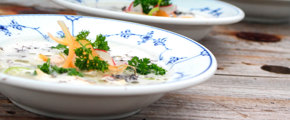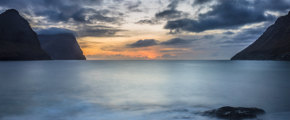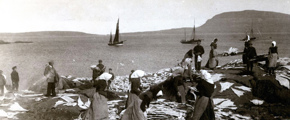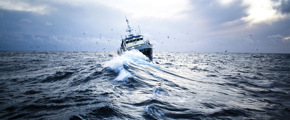Sustainable Aquaculture
The clean, temperate oceanic waters and strong currents in the fjords and sounds around the Faroe Islands are ideal for fish farming.
The Faroe Islands are a proud fisheries nation with centuries-long maritime traditions.
These traditions have been successfully applied to the development of a Faroese aquaculture industry since the 1960’s; an industry that combines an ideal natural environment with a deep commitment to sustainability and quality.
Faroese farmed fish is renowned around the world and Faroese Atlantic salmon is exported to all six continents.
Initially, the Faroese farmed sea trout, but moved on to Atlantic salmon during the 1980’s. Today, the Faroese aquaculture industry almost exclusively farms and exports Atlantic salmon.
A key player on the international market
In recent years, Faroese fish farmers have become important players on the international market. Aquaculture now represents a significant component of Faroese economic activity. Around half of all Faroese export value is farmed fish and the aquaculture industry provides jobs for communities all across the islands.
Faroese aquaculture management has a significant focus on safeguarding the environment in which fish farming takes place. This is fundamental to ensuring an economically self-sufficient and competitive aquaculture industry.
Stringent regimes for veterinary monitoring, as well as measures to minimise the impact that rearing and production methods can have on the marine environment, have been a major factor in the success of Faroese fish farming.
The Faroese aquaculture industry has some of the best results on a global scale. This includes a low biological feed conversion ratio, a low morality rate and a high smolt yield.
The Faroese aquaculture industry is well consolidated, both horizontally and vertically. There are three companies producing and exporting farmed salmon in the Faroe Islands. Producers have full control over the quality of their products – from roe to final product - due to this vertical integration.
Effective logistics
To maintain fish welfare and freshness, it is essential that the transport time from on-growing site to brood stock station is as short as possible.
The Faroe Islands are relatively small, and these transport times are therefore extremely short, guaranteeing optimal freshness and quality.
Although the Faroe Islands are located in the middle of the North Atlantic, the country has an exceptionally well-structured infrastructure.
The Faroe Islands are only a couple of hours’ flight from the European mainland. Logistical management is highly effective and there are regular cargo links and flights to all neighbouring countries.
This means that fresh Atlantic salmon can reach American and Asian markets within 24 hours of being harvested.
Aquaculture and global food security
Aquaculture currently represents over 50% of fish products for human consumption. According to reports from the UN’s Food and Agriculture Organization (FAO) aquaculture will become vital in meeting the rapidly increasing demand for seafood, with Faroese aquaculture contributing to global food security.




